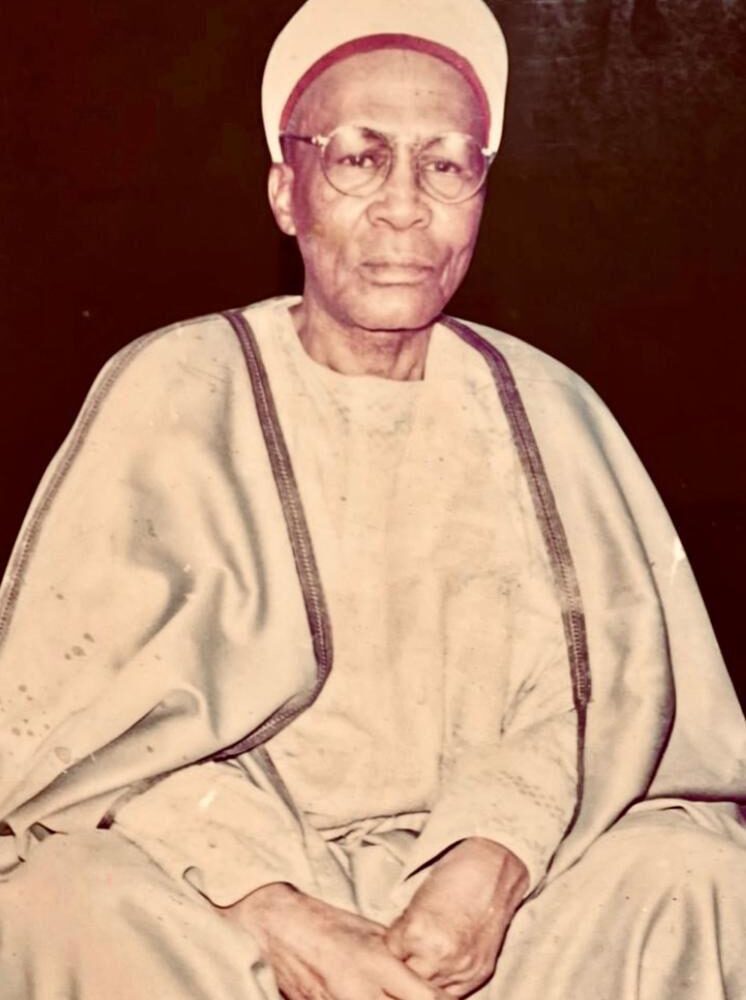Before the advent of unicorn fintechs and banks, people entusted their savings with thrift collectors. One of them stood out in Lagos and the areas that now constitute the South West of Nigeria: Taiwo Olunaike Alphaeus.
But that name may not ring a bell until one says “Alajọ Ṣomolu”, literally meaning the thrift collector of Ṣomolu.
He had no computer knowledge, not to talk of using a balance sheet or running an excel file, but he was good with counting and keeping money.
His fame embodies honesty, faithfulness and the true Nigerian spirit of industry.
This explains why his name was likened to success and smartness in the track “Alajọ Ṣomolu” by Afrobeat singer, Olawale Ashimi, popularly known as Brymo.
Born on September 16, 1915 in Isonyin, a small town eight kilometres from Ijebu-Ode in Ogun State, Alphaeus, also called Sir Alphaeus, was one of the surviving duo of a triplet birth at a time multiple birth was a taboo because it was believed to bring misfortune to the land.
One of the triplets was sacrificed to the gods and anotherer died at infancy. Their father too died three years after their birth.
Baby Taiwo’s close shave with infanticide was rewarded with longevity as he lived for 96 years. Born a year after Britain amalgamated the northern and southern protectorates of Nigeria, he witnessed the country’s independence 45 years later and the 50th anniversary of independence in 2010.
If his name is mistaken as a myth or legend, that is because he is linked to many wise sayings and anecdotes.
Tailor turned thrift collector
At 12, Sir Alphaeus moved to Lagos in 1927 where he was first enrolled at St. John’s School, Aroloya, and then at Christ Church Cathedral School, where he took his first school leaving certificate in 1934.
Two years later in 1936, he took up an apprenticeship role under a neighbourhood tailor named Rojaye. He would spend nine years under Rojaye’s tutelage.
The special kind of microfinance banking Sir Alphaeus came to be popular for is an agelong practice in many Nigerian communities and marketplaces where clients contribute daily, weekly or monthly predetermined amounts to a thrift collector. The collector takes the first contribution as their own fee. The business is called ajọ in Yoruba, esusu in Igbo and akawo/adashe in Hausa.
After four years in Cameroon, Sir Alphaeus was ready to take his trade back home to Nigeria. He returned to Lagos to start his own thrift collection business called the Popular Daily Alajọ Ṣomolu. Not only did he safekeep the savings of individuals, he also offered loans to those he considered had proven integrity.
Photographic memory
This unique trait endeared him to people, many of whom marvelled at his gift.
This gave prominence to the aphorism the Yoruba use in extolling the virtues of wisdom and intelligence in a person; “Ori ẹ pe bii ti Alajọ Ṣomolu, to fodidi ọọdun meta gbajo lai ko oruko ẹni kankan silẹ, ti ko si ṣowo san fenikeni” (meaning: you are as intelligent as Alajọ Ṣomolu, who collected thrift for three years, without writing down a single name, and never made a single mistake in paying back his customers)!
At first, clients approached him with skepticism, but all that soon changed after many testaments of his photographic memory gained traction. Those who dared argue with his impeccable off-the-cuff recollection of statistical details were awestruck when he opened his logbook.
He was a moving bank, ATM booth, chequebook — all in one. His brain worked like cloud.
Trust and integrity are the capital for the business he ran, and Sir Alphaeus was integrity personified. This attracted many clients to him who trusted, loved and respected him, making his boom.
In fact, legends suggested that not only did Sir Alphaeus pay back contributors the exact amount they were due, he also paid them back in the exact notes and coins they contributed.
They were mesmerised by this and he became the number one mobile banking choice for many traders in Sangross, Mile 12, Baba Olosha, Ojuwoye, Awolowo, Oyingbo, Olaleye and Shomolu markets, all in Lagos.
At a time, after one of his cars showed signs of wearing out and was no longer cost effective for his thrift collection trips, he sold off the car and bought a Raleigh bicycle. The bicycle gave him farther reach to areas which were hitherto inaccessible.
This again won him another star in the heart of people as they read that to mean he was an economically savvy businessman. That act passed as further advertisement for his business.
Retired not tired
Even as he aged, his love for his trade and the trust people had in him did not wane. He continued with the business until 2010 when he was 95 years old.
PREMIUM TIMES made repeated but ultimately futile efforts to interview one of Sir Alphaeus’ daughters.
Even after his children pressured him to retire, people continued to throng his house to deposit their daily contributions. This time he no longer went to them, they came to him. He had earned their trust.
As he served his clients so he did his God. He was the lay reader and treasurer for 30 years at the Ṣomolu Anglican Church he attended.
Though he lived a spartan life, he was well-to-do in his own right. He built his first house at No 10, Odunukan Street in Ijesa, and later sold it to the Deeper Life Ministry. He built another house at Olorunkemi, Owotutu Area, Bariga, Lagos.
There, he lived his last days. He died August 11, 2012, and was buried a month later at the Church of Nigeria Cathedral, Isonyin, Ijebu in Ogun State.
Hero deserved a garland
In a country like Nigeria starved of true national heroes, Sir Alphaeus clearly fits in as one, as opined by Toyin Falola, a Nigerian professor of history at the University of Texas, Austin.
At a time when the get-rich-quick syndrome is raving, the life story of Sir Alphaeus deserves to be told to teach younger generations the virtues of honesty, Mr Falola said.
“This underscores the obvious drift and shift in our value system as a nation that now prefers decorating undeserving citizens in national colours to honouring true heroes,” the don wrote shortly after Sir Alphaeus died in 2012.
“What we need is to unravel it and seek a way to provide the solution. Education may not teach that, but nature does as it did to Olunaike, the famed Baba Alajọ Ṣomolu, who sold his bus to buy a bicycle, not because he was interested in cycling or preparing for the Olympics, but for him to reach the distance that those with cars and great education may never reach. Such a story deserves our attention as a nation. And for me, such a man deserves the place of a national hero.”
It would not have been out of place if a man like Olunaike, as popular as he was, had been sought out and given national recognition for his pioneering efforts and widely acclaimed industry.
Sir Alphaeus escaped being killed at birth, lived to be nearly a centenarian and left behind a name that will never die.
![]()
Share via:





